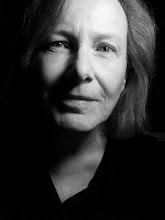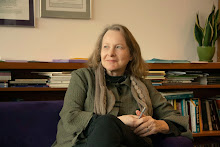
Along with the contemporary poem's romance with ellipsis and various indeterminacies comes a weird relativism; that is, a sense that the poem can be re-arranged in many different ways to achieve different, and sometimes better, results than the ones in the author's own version. This raises the question of inevitability--is the final, perhaps even published, poem the best poem it can be, or is it simply where the author stopped revising it? It also raises the issue of author intention: where is the border, if there is one, between the author's intended "meaning" and the reader's perceived "meaning?" Does the author's intention matter in the reading of a poem? Should it? Or (as I believe), should the poem trump the poet? Often the poem is better than the poet allows it to be, or enables it to be. Here is the original, relatively straightforward, poem:
In January
Ted Kooser
Only one cell in the frozen hive of night
is lit, or so it seems to us:
this Vietnamese café, with its oily light,
its odors whose colorful shapes are like flowers.
Laughter and talking, the tick of chopsticks.
Beyond the glass, the wintry city
creaks like an ancient wooden bridge.
A great wind rushes under all of us.
The bigger the window, the more it trembles.
Here is another version with no other changes but in line order:
In January
This Vietnamese café, with its oily light,
its odors whose colorful shapes are like flowers
is lit, or so it seems to us:
only one cell in the frozen hive of night.
A great wind rushes under all of us.
The bigger the window, the more it trembles.
Laughter and talking, the tick of chopsticks.
Beyond the glass, the wintry city
creaks like an ancient wooden bridge.
In this version, the poem starts inside the café and moves outward to the city as a whole. It hangs together because each line has a wholeness of its own but is not linked by necessity of narration to its immediately preceding or succeeding line. The gaps, or ellipsis, between and among lines, allows movement of them to other positions, and produces a different frisson. While the opening line of Kooser's original poem is superior to this opening—it is a more striking image, while this opening is simply good description—the ending of this version strikes me as better. The last line, while arguably too big (a "western" ending which I'll discuss in another entry), is less faux-epigrammatic (the "bigger the window" etc., echoes "the bigger they come, the harder they fall" and ending on that line calls attention to the clever, but empty, echo—empty because while the literal part of the line may be true, a bigger window trembles more in the wind, its epigrammatic echo has no real resonance in this poem). Also, compared with the author’s original version, this version seems more mysterious, less linear and, to my mind, more interesting in its progression for those reasons. It’s also a bit darker, less cozy, more about the menace outside, the unpredictable nature of weather, winter, and the bridge out of the city is not safe, is one that creaks. It is, in fact, ancient. This ending is not as pat as the ending in the author’s version.
Here is a third version:
In January
A great wind rushes under all of us.
The bigger the window, the more it trembles.
Beyond the glass, the wintry city
creaks like an ancient wooden bridge.
Laughter and talking, the tick of chopsticks.
This Vietnamese café, with its oily light,
its odors whose colorful shapes are like flowers
is lit, or so it seems to us:
only one cell in the frozen hive of night.
Many poems can be upended to good effect. This seems surprising, but if you think about it, poets write toward the epiphany, the big idea, the emotional high, and that very progress is itself a cliché no matter how well or originally it's written. That's because we expect the wind-up before the pitch in every kind of discourse, not just poetry. It's how the mind works and so we echo that working in writing. One way to lessen the predictability of this kind of writing is to "delay cognition" through a simple grammatical strategy like prolonging a clause, or not stating the agent/subject immediately. In this version of Kooser's poem, the big ending lines are first, so now the poem becomes an exploration of that mighty conclusion, something like the cinematic flashback, and the emotional center shifts from the menace outside, the indifference of nature, to the small but enduring grace of human company, giving the poem another kind of feeling, less dark. The line about the "one cell" now has a very different resonance as the poem moves toward, not away from it--and the "hive" speaks of human contact, the sense of huddling together in "one cell" more than alienation in the bigness of a winter night, an indifferent universe.
Looking at all three versions, it seems to me that the author's own version is the weakest of the lot, but could be improved greatly by cutting the line "the bigger the window" altogether, and re-arranging the lines once again:
In January
Only one cell in the frozen hive of night
is lit, or so it seems to us:
this Vietnamese café, with its oily light,
its odors whose colorful shapes are like flowers.
Laughter and talking, the tick of chopsticks.
A great wind rushes under all of us.
Beyond the glass, the wintry city
creaks like an ancient wooden bridge.
A poem is on a continuum of creation. The poet chooses when to stop. Sometimes the poet doesn't know best, but the poem does. The poet needs to listen to the poem.




3 comments:
Joan, I loved what you did with "In January"! And you are so right, we often put stuff into our poems that we aren't aware of until somebody else points it out. Or, to quote the immortal Pooh, "It isn't brains, Rabbit, but it comes to me sometimes." As for "is it simply where the author stopped revising it," this puts me in mind of the immortal John Huston's "Movies aren't finished--they're abandoned." I know I frequently do a final revision a long time after a poem has been "finished" and sometimes even published.
Thanks for your comment, Sarah. Yes, that "abandoned" remark--I think it's been attributed to Picasso also. I like your Pooh quote. ;-)
I completely disagree. I think that you are unable to see the beauty of the poem because you are hung up on the notion that the last line "the bigger the window the more it trembles" is an overused idea, a cliche. But if you would GET OVER IT you would see that the poem could point to a conclusion that is completely from what you preveiously thought. look at this: http://www.eliteskills.com/analysis_poetry/In_January_by_Ted_Kooser_analysis.php
At the bottom is a wonderful analysis of the poem.
It may only focus on a single aspect of the poem, and i believe that there are many, many, layers of this poem. But i STRONGLY disagree with your declaration that the poem would be "better off without the last line." Each line of a poem has a purpose. Each word and each implication. To the writer of the analysis in the link, the last line of the poem implies life, and not a pathetic excuse to connect the poem to something more.
Post a Comment